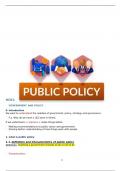HC01:
GOVERNMENT AND POLICY
0. introduction
We want to understand the realities of government, policy, strategy and governance.
- F.e. Why do we have a LEZ-zone in Ghent.
If we understand -> improve = make things better:
- Making recommendations to public sector and government
- Sharing better understanding of how things work with people
1. what is public policy
1.1. definition and Characteristics of public policy
Definition: Anything a government chooses to do or not to do
- Characteristics
1
, o It is a conscious and deliberate decision
Consciously aligned decisions/process
Decisions that steer public funds in one direction and not in the other
o A response to some sort of problem or challenge. Made on behalf of the public <=
when do we make policy (EX)
You need to frame the problem to make it to the agenda (=making choices)
How do we put a frame around a certain problem that
it comes on the agenda?
F.e. lose off traffic in the port of Antwerp. This is not a
problem now but it will be a problem in the future
because of a loss of income for Antwerp & Belgium.
o Oriented towards a goal or desired state
Formalized targeted action
Changing behaviour of social groups that are supposed to be at the basis, or capable of
solving the collective problem
Common societal goals or purpose
o Made by governments <= who make public policy? (EX)
Politicians
Even if the formulation of the policy or its triggers are from outside the formal body of
government
Scientific experts or lobbies can have influence on the policy making process but in the
end the government is the only entity that makes policy!
Example of public policy
- Opening the schools back after the corona lockdown out of the idea that covid is less dangerous
for children, but what about the teachers? They feel Abandoned.
Once we make a policy decision, groups are effected
Example of framing
- Law which prohibited social media posts of unrealistic body tips and the filters.
o They framed the problem by showing numbers of children with depression, suicide of
children, unsecure children
- Essential is the fact that this is a problem in a well developed country. In Emerging countries this
is not a policy problem because they have other problems that have a higher priority (f.e. basis
wage for food).
= policy takes place in a certain context!
We interact with public policy and policymaking in our daily lives. You
can see that almost everywhere
2
,1.2. Types of public policy
(Examen = Give me an example of this policy type // match the example with the correct
policy type)
Primary rule = imposes obligations or positions (intention) (opleggen van verplichtingen,
verantwoordelijkheden of posities)
- Individual conduct (Impact) (gedrag of handelen van een individu)
o Regulatory policies
= Rules impose obligations; rules of
individual conduct, criminal in form
Regels of voorschriften invoeren om
gedrag te sturen, verplichtingen op te
leggen, of ongewenst gedrag te
beperken
Synonyms: policing power, government
intervention
Examples: public health rules, industrial
safety, traffic laws, antitrust
Own examples:
arbeidswet (reguleert arbeidsduur, rusttijden, nachtwerk)
wetgeving rond verkeersveiligheid (reguleert alcohol en drugs, snelheidsbeperkingen,
keuring, sancties)
- Environment of conduct (Impact) (omstandigheden, context of omgeving)
o Redistributive policies
= Rules impose classification or status; rules categorising activity
Zijn gericht op het herverdelen van middelen, rijkdom of macht binnen de
samenleving. Dit type beleid probeert economische en sociale ongelijkheden te
verminderen door middelen te verschuiven van bepaalde groepen naar andere,
meestal via belastingen of sociale programma’s.
Synonyms: fiscal and monetary policy, overall budget policies
Examples: income tax; federal reserve discount rates, social security
Own examples:
Vermogensbelasting
Progressief belastingstelsel
Secondary rule = conders power of privileges (intention) (bevoegdheden of privileges die aan
iemand worden toegewezen of gegeven door een autoriteit of instantie, en hoe deze
bevoegdheden of privileges kunnen worden gebruikt om een bepaald doel of gedrag te bereiken)
- Individual conduct (Impact) (gedrag of handelen van een individu)
o Distributive policies
3
, = Rules confer facilities or privileges unconditionally
Overheid gaat middelen, voordelen of privileges verstrekken aan specifieke groepen,
regio's of sectoren, zonder dat dit ten koste gaat van een andere groep
Synonyms: patronage, subsidy, pork barrel
Pork Barrel= verwijst naar overheidsbeleid of -uitgaven die bedoeld zijn om specifieke
voordelen te bieden aan een bepaalde regio, groep of kiesdistrict, vaak met het doel
politieke steun te winnen of te behouden.
Examples: Public works (openbare infrastructuurprojecten), agricultural extensions
(landbouwsubsidies), land grants
Own examples
Kinderbijslag
Sociale huisvestiging
Studiebeurzen of subsidies voor onderwijs
- Environment of conduct (Impact) (omstandigheden,
context of omgeving)
o Constituent policies
= Rules confer powers: rules about rules and
authority
Is gericht op de opbouw, organisatie, of hervorming van de overheid zelf en haar
instellingen. Dit type beleid richt zich op het vaststellen van regels over hoe macht
wordt verdeeld, welke bevoegdheden overheidsinstellingen hebben, en hoe deze met
elkaar en met het publiek communiceren.
Synonyms: overhead auxiliary, government organization
Examples= Agencies for budgetary and personnel policy laws establishing judicial
jurisdiction
Own examples:
Oprichting van nieuwe overheidsinstanties (FAVV, FAGG, Ministerie van Klimaat)
Grondwettelijke hervormingen (Sint-Michielsakkoord, Vlinderakkoord)
Wetgeving voor rechterlijke bevoegdheid
More on policy types (regulatory policy):
- Competitive policy: restricts access to the provision of certain goods or services. Imposes
conditions that the facilities must meet.
o F.e. protection fee of 20% if you want to import steel in to Belgium to protect the Belgian
steel industry against competition outside Belgium.
- Protective policy: is intended to protect citizens by establishing the conditions under which
private activities may be provided and non-compliance with them sanctioned.
o F.e. if you want to sell agricultural products, you need to have a certain health
requirements
o F.e. if you want to sell face masks, it’s need to have a certain (health) label
- Self-regulating policy: corresponds to protective policy, although the initiative is taken by the
providers themselves.
o F.e. Certain industry standards
4




